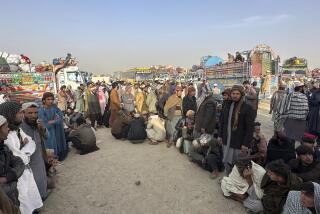U.S. Asks Pakistan for Help to Track Down Bin Laden
- Share via
WASHINGTON — In a day of intense diplomatic efforts that increasingly focused on Osama bin Laden, the Bush administration presented Pakistan with a detailed list of demands to help track the Afghanistan-based militant.
The U.S. received a broad promise of “unstinted cooperation” from Pakistan and expects a quick response to the detailed list. According to diplomatic sources and administration officials, the requests include:
* Access to and assistance from Pakistani intelligence.
* Help in identifying the vast array of networks and agents worldwide sponsored by Bin Laden’s Al Qaeda organization.
* Tracking and closing off Al Qaeda’s financial assets and supply lines, and cutting off Afghanistan’s access to fuel.
* Closing Pakistan’s border with Afghanistan and shutting all militant Islamic schools and camps in Pakistan.
* Help with whatever retaliatory action the United States decides to take, including access to Pakistani airspace and logistical support. The U.S. interprets that demand to include deployment of American troops in Pakistan.
A well-placed diplomat from South Asia conceded that Pakistan might have difficulty fulfilling some of the requests.
“There is the doable and the wishable,” said the diplomat. “We have concerns about the possible backlash to some of these requests. That’s the primary concern” of the Pakistani government.
A senior State Department official noted: “In some ways, we’re asking the same things of Pakistan as we’re asking of everyone else--information, cutting off access and ending their ability to operate. In Pakistan, the requests are more specific because Al Qaeda operates in that area.”
U.S. officials willing to discuss the demands requested anonymity because of the sensitive negotiations.
The State Department delivered the list to Pakistani Ambassador Maleeha Lodhi here after Secretary of State Colin L. Powell held a 10-minute telephone conversation with the South Asian nation’s president, Gen. Pervez Musharraf.
“I wish to assure President Bush and the U.S. government of our unstinted cooperation in the fight against terrorism,” Musharraf said in a subsequent statement. “The world must unite to fight terrorism.”
In Islamabad, Pakistan’s capital, an advisor and spokesman for Musharraf said the close consultations carried out by the Bush administration, plus the feeling of horror left by the terrorists’ assault on civilians, have made Pakistanis much more willing to accept a well-explained U.S. military strike on Afghanistan.
Even if some Pakistanis object, the Musharraf government is confident that it can contain any protests, Maj. Gen. Rashid Qureshi said in an interview with The Times.
A spokesman for the Jamaat-i-Islami religious-based party, Syed Munnawar Hasan, warned that any such action would be very risky for the government.
Qureshi, a presidential aide, said that if the U.S. were to take “drastic” steps against Afghanistan, it first ought to provide Pakistan’s government with convincing proof and reasons for its actions.
After a 40-minute meeting with Musharraf on Thursday afternoon, new U.S. Ambassador Wendy Chamberlain sounded confident that the U.S. had won backing from the Muslim nation. “We had a meeting of the minds,” she said. “The president pledged cooperation with us.”
Although Bin Laden has emerged as the primary focus of the U.S. investigation, a senior administration official said Thursday that intelligence agencies are exploring the possibility that more than one group was involved in the massive attacks Tuesday.
Powell said he will approach Pakistan as a “friendly country,” but he was also the first U.S. official to acknowledge publicly that Bin Laden is the prime suspect--making Pakistan the most critical element in the new global coalition the U.S. is trying to put together for any retaliatory action.
Even so, U.S. officials have expressed concern about whether Pakistan’s military regime, which toppled a democratically elected government in a 1999 coup and has since been under pressure from a burgeoning Islamic movement, will be able or willing to follow through on all of the requests.
In part because it faces traditional rival India to the east, Pakistan has found it important to seek good relations with Afghanistan to its west. Since 1996, Afghanistan has been controlled by the Taliban, a strict Islamic militia.
But over the past two decades, religious teachers with views akin to those of the Taliban have tried to impose their agenda on Pakistani society, pushing for strict Islamic laws, urging bans on some books and persuading women to wear head coverings.
But Qureshi, the presidential aide, said he believes that the power of Islamist political forces in Pakistan has weakened since 1998, when the U.S. launched a cruise missile attack against Afghanistan, triggering protests in Pakistan. The attack was carried out after the U.S. embassies in Kenya and Tanzania were targeted by terrorists who U.S. officials believe answered to Bin Laden.
Reflecting fears of imminent U.S. military action, many foreigners fled the Afghan capital, Kabul, on Thursday after being advised by their governments to leave. Among those leaving were German, Australian and U.S. diplomats in Kabul to monitor the trial of eight foreign aid workers accused of trying to convert Muslims to Christianity. The accused aid workers, however, were unable to leave.
News agencies reported that key members of the government, including Taliban leader Mullah Mohammed Omar, had taken shelter outside the capital.
*
Wright reported from Washington and Daniszewski from Islamabad. Staff writer Tyler Marshall in Islamabad also contributed.
More to Read
Sign up for Essential California
The most important California stories and recommendations in your inbox every morning.
You may occasionally receive promotional content from the Los Angeles Times.













